
20 Aug 2025
“CML changed the whole trajectory of my life.”
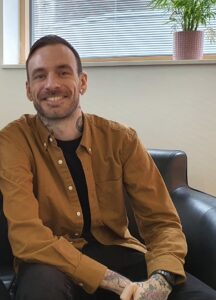
Stewart
Stewart O’Callaghan was living a carefree life in Berlin when leukaemia changed everything. Only 28 years old at the time, little did they know the shock diagnosis and gruelling treatment would lead them to a completely new career path in becoming a powerful voice for the LGBTIQ+ experience of cancer.
It was early December 2016 when strange symptoms led Stewart to the doctor.
“I was having symptoms similar to allergies which I was being given topical steroids for – particularly inside my nose,” said Stewart, now 37 and living in London. “But the main symptom was that I had food poisoning that didn’t resolve. After a week with no improvement I went to my doctor in Berlin and he took a blood test. I went home and he called me later that night to ask if I was feeling okay. I told him I felt fine. He asked me to pack a bag and go to A&E as soon as possible and ask for a blood test.
“At the A+E they confirmed that I had an elevated white blood cell count and asked me to stay there whilst they consulted the specialists. A doctor came in and told me it was likely cancer. But then another came in later saying it was probably just an infection and to go home and come back for a blood test in a week or two.
“I did that and again had a high white blood cell count with no improvement. Eventually my GP got frustrated that the hospital was not taking things seriously and he helped me get admitted to a different hospital. Here they confirmed the high count and scanned my abdomen and saw that my spleen was enlarged. After exhausting everything else they tested for leukaemia and I went home to await the results.”
Stewart was diagnosed with chronic myeloid leukaemia (CML) on 6th January 2017. CML is most often found in people over the age of 50 and is exceptionally rare for someone of Stewart’s age – only 18 cases a year are recorded in this age group, 2.2% of those diagnosed each year. It’s a rare type of blood cancer that develops slowly and affects the bone marrow and white blood cells.
“They told me it was lucky to be caught before it had progressed very far, and that I was lucky to be young. I was in shock and not really able to process the news. I had felt somewhat prepared since that first doctor suggested it might be cancer, so in a way there was relief of confirmation and the rest was almost a dissociation. I went straight back to my work as a tattooist the same day as the appointment. I think, honestly, I spent the first two years in shock. Whilst I came to terms with the pragmatics of it all, the emotional weight didn’t hit me for a long time.
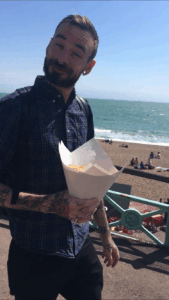
Stewart during treatment.
“Once this result was confirmed with a bone marrow biopsy, I was given the chemotherapy drug Imatinib. I didn’t tolerate it well – it made me weaker, tired, my legs hurt all the time, and I got bouts of dizziness. They considered putting me in for a drug trial, but when I made the decision to return to the UK for treatment it was agreed to keep me on Imatinib to make the transfer easier.”
Stewart went back to the UK initially to stay with their mum but soon moved into shared housing in Brighton, a place they had previously lived which they felt would have a gentler pace of life to the capital and where there was a welcoming LGBTIQ+ community.
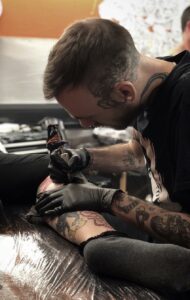
Stewart worked in a tattoo shop.
“I’d worked in a tattoo shop in Brighton before so I had contacts and work. I started treatment in the Royal Sussex County Hospital in Brighton but was then referred to Kings in London for more specialist treatment as none of the drugs seemed to be the answer. Travelling up and down was getting difficult and expensive so I moved back to Brixton to be near Kings Hospital. After Imatinib they tried Nilotinib, Bosutinib, Ponatinib, Asciminib, and then back to Ponatinib which had the most effect and least toxicities. Although it’s not the perfect answer, it seems to work well at keeping me stable on a low dose regimen that helps me manage my side-effects. The doctor said he didn’t know why it was working at such a low dose but it was, so let’s stick with it.”
During this period Stewart had had to give up work because of the side effects of their treatment. It also affected their mobility, leading to them needing a stick to walk. This meant they could no longer manage the stairs in their shared accommodation in London. Having lost their income and in the middle of complicated cancer treatment, Stewart found they were homeless.
“CML changed the whole trajectory of my life. Prior to cancer I was a tattooer living in Berlin with a life of friends, fun, and abandon. But slowly bit by bit the cancer took my career from me, my home, my savings, my health and I ended up destitute in emergency accommodation.
“Tattooing is quite a physical job and with the fatigue and mobility issues I just couldn’t cope. My shared house had lots of stairs so I had to leave but had nowhere to go. I had sold my car to get money and was battling through the benefits system. After delays and getting my local MP involved I discovered my Universal Credit application – which is supposed to be fast-tracked for anyone with cancer – hadn’t been properly submitted. Eventually I got the money backdated. The Council moved me into temporary accommodation. I felt like I was fighting to sort my life out whereas all I should have been doing was concentrating on my health. And I felt so isolated with no one to share my experience and support me.”
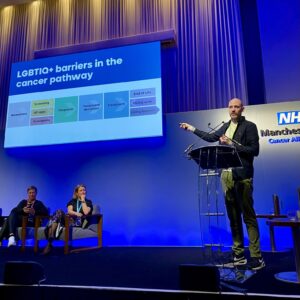
It was during this time Stewart realised there must be others going through what they were, particularly from the point of view of being a Queer person with specific life circumstances and health needs. From this came the idea of setting up a charity.
“I started OUTpatients after realising I really needed to talk to other LGBTIQ+ people about the cancer experience. Alongside my life falling apart in so many ways, there were also specific answers to questions and support I needed because of my identity and I thought others in the LGBTIQ+ community might be having the same experience. For example – what about taking PrEP for HIV during cancer treatment, what about fertility options, what about support for partners, what about sexual health, what about the cancer system’s support for people who are trans and non-binary? I had signed up as a participant for a research project with ACCESSCare Kings which was following LGBTIQ+ people with serious and life-limiting illnesses and the staff there and in the hospital were really encouraging in me taking this further.”
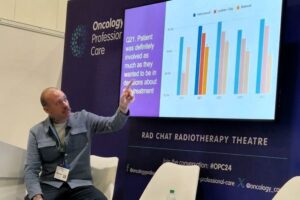 OUTpatients was created to bring together the LGBTIQ+ community to be seen and supported. It runs online support groups and works directly with the NHS to bring about changes to support LGBTIQ+ people better, and is now the largest UK cancer charity serving this community.
OUTpatients was created to bring together the LGBTIQ+ community to be seen and supported. It runs online support groups and works directly with the NHS to bring about changes to support LGBTIQ+ people better, and is now the largest UK cancer charity serving this community.
“Before I became a tattooist I had a psychology Masters and was studying for my PhD but I had to give that up as I couldn’t afford to continue it. Now I was able to draw on all my experience of the healthcare system, I was able to read papers, source statistics and put together an argument. This helped the charity grow quickly.
Share your story
We want to help people tell and share the leukaemia stories that matter – stories like Stuart’s and stories like yours.
Related posts
21 June 2023
Prestigious jointly-funded fellowship could be catalyst for myeloma prevention
Dr Louise Ainley, University College London, has been awarded a Clinical Research Training Fellowship – jointly funded with the Medical Research Council. The three-year project is set to investigate which…
23 September 2022
Spectacular sailing challenge in memory of Pat Buckley
Royal Corinthian Yacht Club’s 61st Endeavour Trophy fundraiser for Leukaemia UK A fleet of thirty boats displaying the Leukaemia UK logo on their sails will put on a spectacular racing…
9 January 2018
Blood cancer and your emotions – an expert’s insight
Specialist blood cancer counsellor Philip Alexander explains why talking therapies can form a crucial part of treatment
29 February 2024
Nurse who made throwaway comment before blood cancer diagnosis welcomes new research boost into ‘Natural Killer’ cells
A former nurse, midwife, health visitor and NHS manager is welcoming new research into her particular blood cancer, after not recognising her mystery symptoms were leukaemia. Kay Cutting, from Seaham…